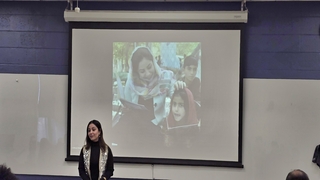Panel Honors Late Professor While Exploring Women’s Resistance in Authoritarian Regimes
Monday, April 7, 2025

PanteA Bahrami, former Seton Hall German language professor
On March 28, 2025, as part of the Seton Hall University Conference on Women and Gender, Muhammad Farooq, Ph.D., assistant professor of English, and Jessica Wilson, director, Global Learning Center, in collaboration with the History Department and the Middle Eastern and North African Studies Program, organized and presented “Everyday Resistance: Women's Tales from Iran and Afghanistan,” a panel in honor of late Seton Hall Professor, PanteA Bahrami. The panel presented part of a documentary by Professor Bahrami and then showcased two invited speakers who shared their personal experiences as vocal resisters in authoritarian countries.
Director Wilson introduced the panel with a biography of PanteA Bahrami, who was a German language professor at Seton Hall until her untimely passing in the spring of 2022. Born in Iran, Bahrami was a prolific documentarian who was arrested at age 23 by the revolutionary guard for working with a left-leaning newspaper in Tehran. After her release in 1987, she moved to Germany and worked as a journalist and radio and television producer covering human rights, culture, labor and women’s issues.
Bahrami completed 20 award-winning documentaries during her career, including the film shown at this event, “From Scream to Scream,” which tells the story of Soudabeh Ardavan, an artist who spent eight years in jail in the 1980s for her political activism against the Islamic Republic of Iran. During her time in prison, Ardavan created and smuggled out more than 200 paintings and drawings, which are highlighted in the film as she discusses their meanings. Some of the pictures show quiet and peaceful memories of the nature she could not see from inside the jail, some reflect events that occurred during her time in prison, the sadness and horrors of which she recounts on-screen from her home in Sweden. The stories behind each piece underscore the everyday resistance Ardavan practiced during her brutal imprisonment.
After the film, guests Sahar Delijani and Homeira Qaderi spoke about their lives as activists in Iran and Afghanistan, respectively. Delijani joined the event virtually from California and related how being born in an Iranian prison (as both her parents had been arrested as leftist political activists after the 1979 Revolution) and then raised by her grandparents and aunt informed her book, Children of the Jacaranda Tree, which has been translated into 32 languages. She narrated passages from her recent work and answered questions from the audience, sharing how publicly acknowledging and speaking about her experiences evolved from her youth to adulthood.

Homeira Qaderi
Homeira Qaderi, an Afghan writer and advocate for women’s rights who is currently a lecturer and associate research scholar of Middle East Studies at Yale University, spoke passionately to the audience about being targeted by the Taliban for her writing and activism. She told the story of her brother being arrested in the regime’s attempt to silence her, recounting how she asked him if she should keep silent and how he encouraged her to keep fighting despite his imprisonment. Qaderi highlighted her book, Dancing in the Mosque: An Afghan Mother's Letter to Her Son, which compiles letters she wrote to her young son after losing him in a contentious divorce, after which he was told she had died. She also discussed Mitchell Zuckoff’s book, The Secret Gate, which tells the story of her 11th-hour escape during the U.S.’s 2021 evacuation from Afghanistan with the son she won back; Qaderi noted that discussions are taking place now to potentially turn her experience into a movie.
These real life stories of women from the Middle East who fought and continue to fight against brutal regimes were painful and eye-opening, but they accentuated the extent to which resistance transcends oppression and gives voice to those who defy and withstand tyranny in everyday ways.
The panel organizers extend their thanks to the Department of Languages, Literatures and Cultures for its support. In addition, they thank the DEI Committee, who funded/sponsored the program. Finally, they thank PanteA Bahrami’s family for providing copies of the documentaries used to develop the event and note that they will be getting her works archived into the Seton Hall Library so as to honor her legacy.
Categories: Nation and World





